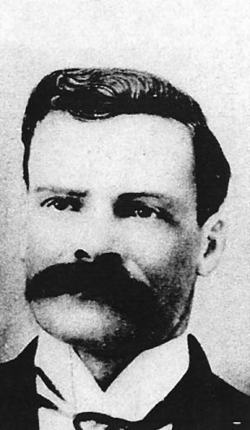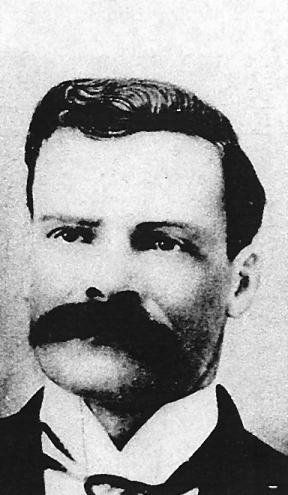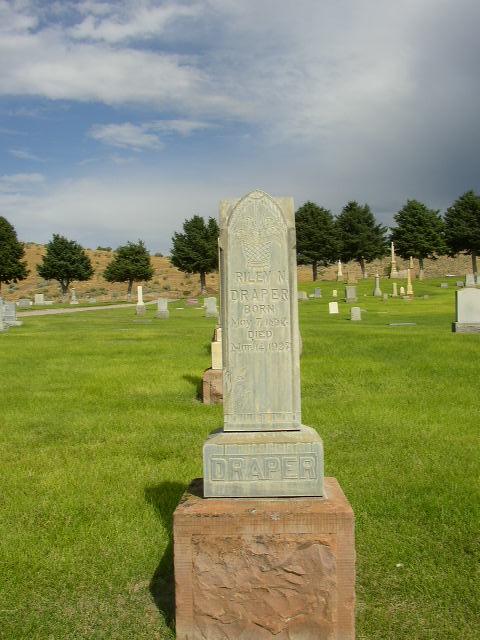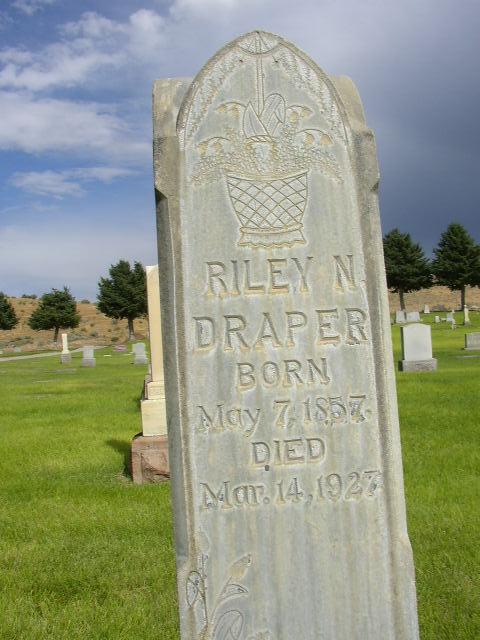Riley was seven years old when he arrived in Moroni. From that time on he had to help support his mother and her other children, because of the reverses suffered by his father in this last move, and because of the extraordinary size of his family.
Riley fell in love with Lena Margretta Morley, granddaughter of Isaac Morley, Sr. - the Draper and Morley families had been closely linked since their conversion to the Church of Jesus Christ of Latter-day Saints, and Joseph Smith, Jr. knew and loved both families well. Riley and Margretta were married January 2, 1879.
Riley had scarcely any formal education and nothing to offer to his bride but his hands and a will to work. Wage labor at that time would not bring more than $1.25 for twelve hours. Nevertheless, he faced the future with optimism and confidence. Not long after they were married there began to be talk about constructing a new irrigation canal from the Sanpitch River to irrigate some unclaimed land between Fairview and Fountain Green. Relying upon this talk Riley immediately filed upon a homestead between Moroni and Fountain Green. To perfect a title to this land he had to pay filing fees and live with his family on it continuously for four years.
This he did, and in the meantime he had to earn money to support his family. First, he built a log cabin with a dirt roof on the land to house his growing family, and then he took a job as a section hand on the narrow gauge railroad that ran through the valley. He left home before daylight and did not get home until after dark and he worked seven days a week for the sum of $1.25 a day.
He worked at sheep-shearing in the spring, and by dint of immense labor managed to clear his land and operate a farm. By 1894, seven children were born to him and his wife, two girls and five boys - a family well-adapted to a farm economy. However, tragedy stalked the family. The eldest boys, twins, both died young - one at the age of three, and the other at the age of twelve. In 1897, Riley's wife passed away at the age of thirty-six. The remaining children were either too young or too immature to take on raising a family, so he doubled his efforts to raise the children and work the farm until October 19, 1898, when at the behest of his family he married Eliza Maria Petersen, with whom he subsequently had eight additional children.
Riley was a man of deep convictions and great honor. A fuller account of his life is found in the book "The Mormon Drapers," published by his son Delbert Morley Draper. In the conclusion of the chapter on Riley Newton, Delbert included the following poem, penned by himself, in which he attempted to sum up his feelings about his father's challenging but honorable life:
Father
In the sterile, sun baked valley
He swung his grubbing hoe,
While by his side, his children
Heaped the brush, and thought it fun
To watch the flames, at evening,
Light the sky.
It took five years of bending toil
To break the grip of age old sage
On eighty, arid acres; to dig canals
To carry water to the thirsting grain
Until it waved upon the gray expanse,
A golden sea of gladness
And of hope.
The crop was ripe for harvesting,
But when the reaper came,
The mother who had borne the strain
Of want, and work, and motherhood
Fell ill and died.
A line of dusty wagons followed to the grave
Where clods of earth and alkali
Fell with hollow thud upon the coffin box.
A prayer was said, a marker placed,
And cactus flowers were planted
On the grave.
Dazed and mute, the swinger of the hoe
Bent his back and carried on.
By force of will, he drove his hands
To tasks untried and new,
And though his grief was masked
His voice grew thick, when little eyes
Turned up to him with welling tears
And questions.
Lines of care crossed lines of pain,
But still he worked as if he saw
The broken threads of life unite again.
For thirty years he sowed and reaped
And shared the bounty of his land, and heart,
With others.
And then one spring he died.
Tense at heart, but tearlessly,
His children bore him to his grave
And laid him by their mother.
They planted iris by the cactus flowers
And went their way.
The dearest ties are cut
And yet they walk, as he had walked,
Unmoved by hurts and ills ... If darkness comes,
The sky is lit with fires of sage
And in the light, a deathless figure stoutly swings
A gleaming, grubbing hoe!
Delbert M. Draper
Riley was seven years old when he arrived in Moroni. From that time on he had to help support his mother and her other children, because of the reverses suffered by his father in this last move, and because of the extraordinary size of his family.
Riley fell in love with Lena Margretta Morley, granddaughter of Isaac Morley, Sr. - the Draper and Morley families had been closely linked since their conversion to the Church of Jesus Christ of Latter-day Saints, and Joseph Smith, Jr. knew and loved both families well. Riley and Margretta were married January 2, 1879.
Riley had scarcely any formal education and nothing to offer to his bride but his hands and a will to work. Wage labor at that time would not bring more than $1.25 for twelve hours. Nevertheless, he faced the future with optimism and confidence. Not long after they were married there began to be talk about constructing a new irrigation canal from the Sanpitch River to irrigate some unclaimed land between Fairview and Fountain Green. Relying upon this talk Riley immediately filed upon a homestead between Moroni and Fountain Green. To perfect a title to this land he had to pay filing fees and live with his family on it continuously for four years.
This he did, and in the meantime he had to earn money to support his family. First, he built a log cabin with a dirt roof on the land to house his growing family, and then he took a job as a section hand on the narrow gauge railroad that ran through the valley. He left home before daylight and did not get home until after dark and he worked seven days a week for the sum of $1.25 a day.
He worked at sheep-shearing in the spring, and by dint of immense labor managed to clear his land and operate a farm. By 1894, seven children were born to him and his wife, two girls and five boys - a family well-adapted to a farm economy. However, tragedy stalked the family. The eldest boys, twins, both died young - one at the age of three, and the other at the age of twelve. In 1897, Riley's wife passed away at the age of thirty-six. The remaining children were either too young or too immature to take on raising a family, so he doubled his efforts to raise the children and work the farm until October 19, 1898, when at the behest of his family he married Eliza Maria Petersen, with whom he subsequently had eight additional children.
Riley was a man of deep convictions and great honor. A fuller account of his life is found in the book "The Mormon Drapers," published by his son Delbert Morley Draper. In the conclusion of the chapter on Riley Newton, Delbert included the following poem, penned by himself, in which he attempted to sum up his feelings about his father's challenging but honorable life:
Father
In the sterile, sun baked valley
He swung his grubbing hoe,
While by his side, his children
Heaped the brush, and thought it fun
To watch the flames, at evening,
Light the sky.
It took five years of bending toil
To break the grip of age old sage
On eighty, arid acres; to dig canals
To carry water to the thirsting grain
Until it waved upon the gray expanse,
A golden sea of gladness
And of hope.
The crop was ripe for harvesting,
But when the reaper came,
The mother who had borne the strain
Of want, and work, and motherhood
Fell ill and died.
A line of dusty wagons followed to the grave
Where clods of earth and alkali
Fell with hollow thud upon the coffin box.
A prayer was said, a marker placed,
And cactus flowers were planted
On the grave.
Dazed and mute, the swinger of the hoe
Bent his back and carried on.
By force of will, he drove his hands
To tasks untried and new,
And though his grief was masked
His voice grew thick, when little eyes
Turned up to him with welling tears
And questions.
Lines of care crossed lines of pain,
But still he worked as if he saw
The broken threads of life unite again.
For thirty years he sowed and reaped
And shared the bounty of his land, and heart,
With others.
And then one spring he died.
Tense at heart, but tearlessly,
His children bore him to his grave
And laid him by their mother.
They planted iris by the cactus flowers
And went their way.
The dearest ties are cut
And yet they walk, as he had walked,
Unmoved by hurts and ills ... If darkness comes,
The sky is lit with fires of sage
And in the light, a deathless figure stoutly swings
A gleaming, grubbing hoe!
Delbert M. Draper
Inscription
Riley N. Draper
Born May 7, 1857
Died Mar 14, 1927
Gravesite Details
Headstone marks the graves of wife Lena Margretta Morley and his two eldest sons, Riley Philemon and Riley Philetus.
Family Members
-
![]()
Henry Hagarty Draper
1826–1904
-
![]()
Julia Anna Draper Durbin
1828–1884
-
![]()
Moses Draper
1832–1915
-
![]()
William "Doc" Lathrop Draper
1836–1887
-
![]()
Albert Edward Draper
1840–1913
-
![]()
Parley Pine Draper
1843–1924
-
![]()
Almon Draper
1846–1919
-
![]()
Isaac Grant Draper
1846–1922
-
![]()
Amanda Melvina Draper Smith
1847–1906
-
![]()
Mary Ann Draper Kimball
1849–1921
-
![]()
Nephi Draper
1849–1921
-
![]()
Caroline Draper Tripp
1850–1926
-
![]()
Eliza Jane Draper Smith
1854–1946
-
Almyra Laura Draper Bradley
1855–1875
-
![]()
George Howarth Draper
1855–1933
-
![]()
Brigham Manhardt Draper
1855–1926
-
![]()
Kimball Draper
1857–1923
-
![]()
Luana A. Draper Bradley
1857–1912
-
![]()
Artemesia Draper Anderson
1857–1940
-
![]()
James Draper
1859–1927
-
![]()
Malona Draper Smith
1860–1941
-
![]()
Irene Draper Bradley
1861–1951
-
![]()
Joseph Oscar Draper
1861–1926
-
![]()
John Draper
1863–1865
-
![]()
Amos Draper
1863–1944
-
![]()
Tranquilla Draper Dye
1864–1947
-
Orin Draper
1864–1943
-
![]()
Orvilla Draper Shafer
1865–1943
-
![]()
Mary Ellen Draper Christensen
1866–1915
-
![]()
Ruth Hannah Draper Armstrong
1867–1950
-
![]()
Launy Olive Draper Anderson
1869–1967
-
![]()
Alfred Draper
1869–1959
-
![]()
Aury Draper
1869–1961
-
Ordansa Draper
1871–1871
-
![]()
Charles Thomas Draper
1872–1872
-
![]()
Chester Draper
1873–1888
-
![]()
Myrum Ellinor Draper Lund
1875–1965
-
![]()
Margretta Laverna "Verna" Draper Eliason
1880–1962
-
![]()
Riley Philetus Draper
1882–1885
-
![]()
Rile Philemon Draper
1882–1894
-
![]()
Delbert Morley Draper
1884–1965
-
![]()
Roswell Newton "Ross" Draper
1886–1961
-
![]()
Fanny Abiah Draper
1888–1974
-
![]()
Sherman Lavell Draper
1894–1975
-
![]()
Eliza Irene Draper Hovinghoff
1899–1971
-
![]()
Andrew Maiben Draper
1900–1984
-
![]()
Riley C. Draper
1902–1992
-
![]()
Marvin Petersen Draper
1904–1989
-
![]()
Anna L. Draper
1906–1971
-
![]()
Nida Draper Redmond
1909–1995
-
![]()
William Allen "Bill" Draper
1912–1995
-
![]()
Dennis N Draper
1916–1985
Sponsored by Ancestry
Advertisement
Records on Ancestry
Sponsored by Ancestry
Advertisement




























































